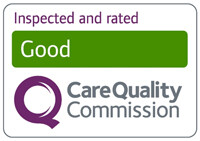Coronavirus (COVID-19) Get information about Coronavirus on NHS.UK
Home » Self-Help and Patient Information » Asthma
Self-Help: Asthma
Asthma
Asthma is a chronic long-term condition that may cause breathing difficulties including coughing, wheezing, chest tightness and breathlessness if not controlled. People can be affected by these symptoms to different degrees, with some people having severe symptoms and others experiencing relatively mild symptoms. These symptoms can vary with time, and occasionally can gradually or suddenly worsen – this is known as an ‘asthma attack’. In severe cases, asthma attacks can be life threatening and require hospital treatment.
It is important that people experiencing any immediate concerns with their asthma should get in contact with their GP or NHS 111 urgently, or 999 in an emergency.
Asthma annual reviews
It is very important if you have asthma that you have regular asthma reviews (at least once a year) with your asthma nurse to check that you are on the right treatment, are using your medication correctly and know what to do if your asthma is becoming worse. This can help keep you well and keep your asthma under control, which can prevent your condition worsening and leading to hospital admission. It is an opportunity to see if there are any changes necessary to your medication, and is an opportunity for you to discuss any concerns you may have with your asthma.
At your asthma review, the asthma nurse will review your current treatment and check you are happy using the medicationand check your inhaler technique. They will discuss alternatives if needed, discuss how to identify if your asthma is getting worse and what steps to take if it does worsen– they will complete a written personalised asthma action plan with you. Please ensure that you keep this somewhere safe but visible to ensure that you know what to do if your asthma worsens (see: https://www.asthma.org.uk/advice/manage-your-asthma/action-plan/ for more information). They may do other checks including checking your weight and height and taking your peak flow measurement. It is also an opportunity to look at other factors that might trigger or affect your asthma such as smoking and allergies.
How well controlled is my asthma?
The Asthma Control Test™ is a tool that provides a snapshot at how well your asthma has been controlled over the last four weeks.
Adults and children over 12 years old – Review here
Children aged 4 to 11 years – Review here
What lifestyle interventions can help?
Although there is no ‘cure’ for asthma, it can be well controlled with medication. Other lifestyle factors that can help include:
- Stopping smoking. It is never too late for this to be beneficial. Smoking-cessation services have been shown to be the most effective way to stop smoking. This can reduce your risk of developing other conditions such as heart disease, COPD and cancer.
Please contact the surgery to book an appointment with the nurse for smoking cessation advice.
- Increase your daily exercise if needed.Birmingham City Council has produced a useful leaflet highlighting a number of useful exercise schemes throughout Birmingham: https://www.birmingham.gov.uk/downloads/file/8106/lifestyles_leaflet
- Maintain a healthy weight. Weight loss if your BMI is greater than 25.
- Have a flu vaccine every year. Contact your GP or practice nurse for an appointment.
- Practice inhaler technique with your practice nurse. Additional information including on inhaler technique can be found at the Asthma.uk website (asthma.org.uk) or by telephone 0300 222 5800.
Asthma and coronavirus: For general health advice regarding asthma please click on the following link https://www.asthma.org.uk/advice/triggers/coronavirus-covid-19/
Further Information:
- https://www.nhs.uk/conditions/asthma/
- https://www.asthma.org.uk/Asthma UK also run a helpline for independent, confidential advice and support run by asthma nurses Monday to Friday, 9am to 5pm on 0300 222 5800(Option 1).
- https://www.nhs.uk/conditions/pregnancy-and-baby/asthma-pregnant/

